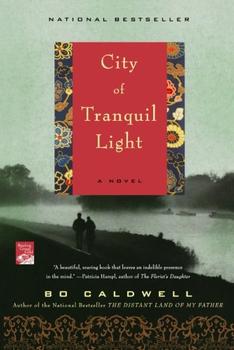Summary | Excerpt | Reading Guide | Reviews | Beyond the Book | Readalikes | Genres & Themes | Author Bio

A Novel
by Bo Caldwell
The next morning Edward spoke at our church. What God asked of us, he said, was nothing less than absolute surrender. "The Gospel tells us this clearly: 'Whosoever will save his life shall lose it: and whosoever will lose his life for my sake shall find it.' The question we must ask ourselves is, What are we holding back? What is it that we will not give up?"
I felt found out, as thoroughly convicted as if Edward had addressed me by name. Something tightened in my center, a tense feeling that stayed with me the rest of the day, and at dinner that night I did not speak. My mother asked if I was ill and whether I wanted to leave the table. A part of me did, but I stayed where I was.
I was sitting next to Edward, who seemed to single me out from my siblings. He asked me kindly about school and farming and my baptism, and he said he could see that I loved God and that my faith would bless me all my life. I said no more than what was required, not because I disliked Edward but because I was so drawn to him. He was tall and thin and awkward and not handsome - unexceptional, like me, I thought - but when he spoke of China, I could not look away.
He talked of Keng-Tze Nien, the Boxer Year six years earlier when thousands of Chinese Christians and 186 missionaries and their children had been murdered for following Christ by members of the secret Society of Righteous Harmonious Fists. But Christ's message would not be stopped, Edward said; the people's needs were too immense. They suffered from ignorance about hygiene and lack of medical care. Many infants died at birth, and fewer than half of those who lived survived to their first birthday. Mothers fed their children rat feces to cure them of stomach ailments, men applied the bile from the gallbladders of bears to heal their children's eyes, and opium addicts and beggars slept in the streets.
Yet Edward made no capital of what he had seen. "The suffering is great, as is the need for help, physical and spiritual." He paused, and his expression softened. "But the rewards are also great. The people are the kindest and most generous I have known. They are wise in many ways, and there is much to learn from them and to admire. They have the right to hear the Gospel."
Toward the end of the meal, Edward turned to me. "I return to China in a few weeks. My wife is there, caring for our children and carrying on our work. We need helpers, for the harvest is great, the laborers few. Why don't you come with me, Will? The Chinese language is difficult, but far easier when you are young. Perhaps this is your calling."
I saw my siblings trying to stifle their laughter. Of all our family, I was the least likely to leave. I wasn't good at speaking in front of people; I became nervous and I stammered. I was quiet and shy, I wasn't a good student, and I disliked being away from home.
"I'm needed here," I said, my voice cracking. "I haven't any training or gifts of that kind."
Edward said, "The Giver of those gifts may feel otherwise," and he looked at me, his blue eyes bright. "A torch's one qualification is that it be fitted to the master's hand. God's chosen are often not talented or wise or gifted as the world judges. Our Lord sees what is inside" - Edward touched his chest - "and that is why He calls whom He does." Then he turned to my father and they began to talk about wheat.
In the morning Edward left to visit other churches; he would return in a week. During those days I struggled, for while I felt pulled toward Edward's work, the idea seemed too foolish to even consider. I couldn't imagine leaving home; I suspected I was unfit for anything but farming, and I thought surely God would want me to remain where I had been planted. I decided I was being proud to think I might be remotely capable of meeting the challenges that must face a man like Edward every day, for in the few years that had passed since I joined the church, I did not feel I had made much progress spiritually. I yearned to walk more closely with God, and while I did experience moments of joy, they were often followed by days of despair. I told myself that surely God would not ask me to do work that was so clearly beyond me, and I fervently prayed that China was not my calling.
Excerpted from City of Tranquil Light by Bo Caldwell. Copyright © 2010 by Bo Caldwell. Excerpted by permission of Henry Holt and Company. All rights reserved. No part of this excerpt may be reproduced or reprinted without permission in writing from the publisher.
When an old man dies, a library burns to the ground.
Click Here to find out who said this, as well as discovering other famous literary quotes!
Your guide toexceptional books
BookBrowse seeks out and recommends the best in contemporary fiction and nonfiction—books that not only engage and entertain but also deepen our understanding of ourselves and the world around us.